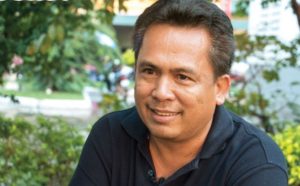Slain Cambodia activist’s family arrive in Australia
The family of a Cambodian political activist murdered in suspicious circumstances has arrived in Australia after being granted refugee status.
The wife and children of Kem Ley have found a permanent refuge more than a year after fleeing home in the wake of his brazen murder.
Kem Ley, a popular analyst and critic who was involved in grassroots political organising, was shot at point-blank range while driving to get coffee at a service station cafe in Phnom Penh in July 2016.
“The Australian government granted them visas on Wednesday 14 February 2018 and they arrived in Australia on Saturday 17 February,” Victorian state MP Hong Lim told the media this week.
 A Twitter account created after Kem Ley was killed posted a photo of his widow, Bou Rachna, and their five children after their arrival in Australia from Thailand, where they had spent the last 15 months.
A Twitter account created after Kem Ley was killed posted a photo of his widow, Bou Rachna, and their five children after their arrival in Australia from Thailand, where they had spent the last 15 months.
The family was granted special humanitarian visas for those “subject to substantial discrimination amounting to a gross violation of your human rights in your home country”.
They can apply for Australian citizenship after four years.
Kem Ley criticised Cambodian politicians of all parties and he was particularly scathing about the corruption that blights the country.
Shortly before his murder he gave an interview about an investigative report that detailed some of the millions of dollars allegedly amassed by the family of long-serving Prime Minister Hun Sen.
The Cambodian government strongly denied any role in his killing.
An unemployed former soldier admitted carrying it out and was sentenced to life imprisonment in March after a brief trial. The killer claimed Kem Lay owed him $3000 but many observers and members of the public have been sceptical of the story.
Kem Ley’s murder shocked Cambodia’s community of activists and civil society, and tens of thousands of people attended funeral ceremonies.
Political assassinations were common in the 1990s and early 2000s in Cambodia but have become rarer in recent years, with the legal system replacing violence as the chosen form of repression.
Hun Sen, in power for 33 years, backed the dissolution of the only viable opposition party last year, and has moved closer to China in the run-up to national elections in July.
Laurie Nowell
AMES Australia Senior Journalist












